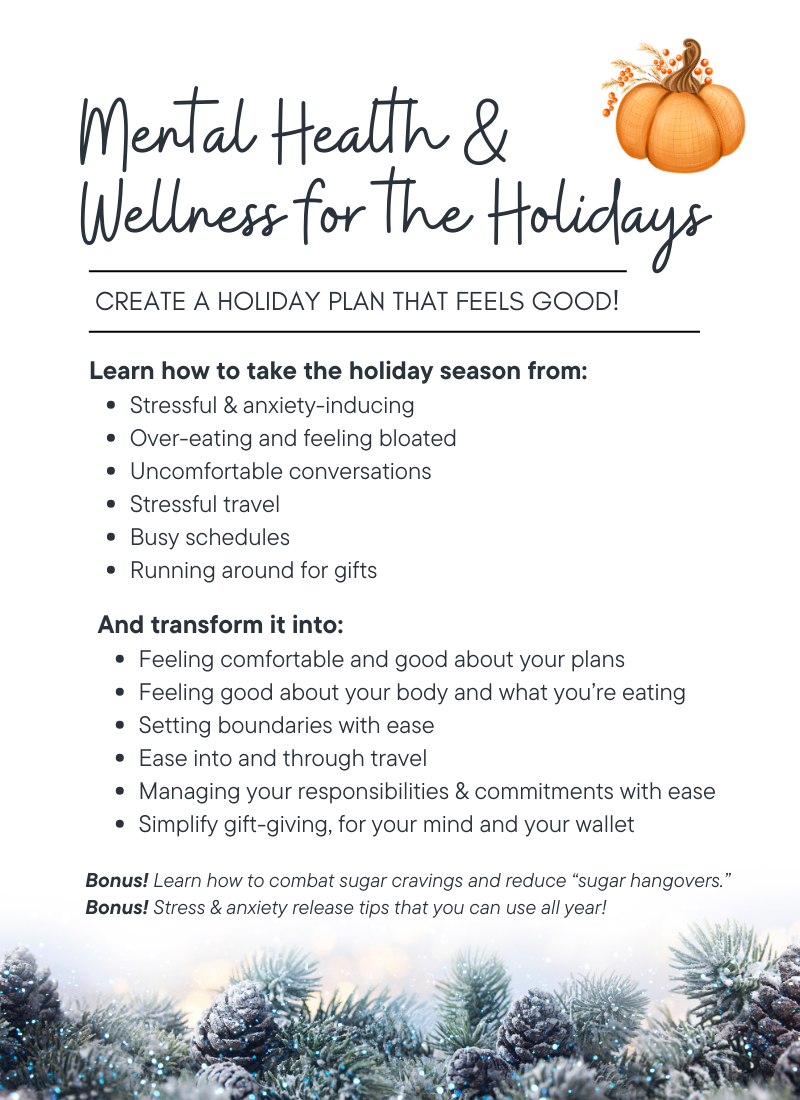Ah, the holiday season—a time synonymous with joy, merriment, and cherished moments with loved ones.
Yet, for many, it's also a period peppered with challenges: navigating complex family dynamics and grappling with the pangs of loneliness.
As we deck the halls and gather 'round the table, the season's festivities often come intertwined with awkward family encounters or a sense of isolation that casts a shadow over the joyous celebrations.
How do we navigate this delicate dance between the warmth of tradition and the discomfort of strained relationships? How can we find solace and connection amidst the loneliness that can pervade this time of year?
In a recent video, I shared three simple yet powerful strategies that can transform your holiday experience, reducing stress both at work and at home. These changes aren't just theoretical; they've been my saving grace for the past eight years, revolutionizing the way I approach this time of year.
Ready to embrace a holiday season that nourishes your soul and fortifies your spirit?
In this article, I’ll share transformative approaches, proactive strategies, and supportive practices that promise to turn this holiday season into a time of resilience, connection, and personal growth.
Let's navigate these challenging waters together, discovering ways to infuse warmth, joy, and a sense of belonging into our holiday experience.
Let's delve into these transformative strategies:
1. Setting Boundaries: Reflecting on what truly matters during the holidays allowed me to discern between obligations and genuine desires. Saying "no" to certain commitments enabled me to invest my time in activities that truly nourish my soul. This simple shift drastically improved my holiday experience, leaving me energized rather than depleted as the year draws to a close.
2. Communication and Support: Implementing open and supportive communication—both at home and in the workplace—proved to be a game-changer. Aligning with my partner's needs enhanced our relationship and fostered mutual support. Similarly, establishing these principles at work brought about a more harmonious and collaborative environment.
Communication is also crucial with family - clearly setting expectations prior to family functions, especially if there are awkward or tricky dynamics at play. Get clear about your plan and know how you will support yourself through these endeavors.
3. Fostering Important Connections: Making a conscious effort to cultivate deeper connections with chosen loved ones and colleagues transformed the holiday season into a time of genuine warmth and fulfillment. This change didn't just alleviate loneliness; it enhanced the quality of my relationships, leaving me feeling more connected and fulfilled.
What’s important here is deciding who is important to you and prioritizing time with them. By filling your cup, you’ll be able to handle more awkward and difficult encounters with greater ease.
4. Proactive Response Planning: One powerful strategy to tackle awkward family dynamics or challenging situations during the holidays is proactive response planning. Often, we find ourselves reacting impulsively or falling back on old patterns in difficult moments. However, taking a proactive approach by planning responses can make a significant difference.
Identify Triggers and Desired Responses: Begin by recognizing potential triggers—whether it's a sensitive topic of discussion or a particular family member's behavior. Next, envision how you ideally want to respond in these situations. Consider responses that align with your values and prioritize maintaining harmony while asserting boundaries if necessary.
Practice Mindful Responses: Take a moment to breathe and center yourself before responding. Mindfulness can help you navigate stressful situations more calmly and thoughtfully. Consider phrases or actions that diffuse tension and steer conversations toward more positive or neutral topics.
Set Realistic Expectations: Acknowledge that you can't control others' behaviors or opinions, but you have agency over your reactions. Setting realistic expectations for interactions can help manage disappointment and reduce the likelihood of being caught off guard.
Create Supportive Exit Strategies: Sometimes, despite your best efforts, situations can become overwhelming. Prepare exit strategies in advance—a walk outside, lending a hand in the kitchen, or engaging in an activity with kids—that allow you to gracefully step away and recalibrate if needed.
By planning proactive responses, you empower yourself to navigate challenging moments with grace and mindfulness, steering interactions in a direction that aligns with your well-being and values. This proactive approach helps prevent old habits or reactive responses from overshadowing the holiday experience.
What’s Next?
If you resonated with these strategies and want to explore more effective ways to navigate the holiday season while preserving your mental well-being, I invite you to check out my Holiday Mental Health & Wellness On-Demand Workshop. This workshop is designed to equip you with practical tools to manage stress, foster meaningful connections, and reclaim the joy of the holidays.
Let's make this blog post a space for sharing—what methods or practices do you employ to mitigate stress and navigate the holiday season? Share your thoughts in the comments below!
Together, let's support each other in making this time of year more fulfilling and less stressful.


